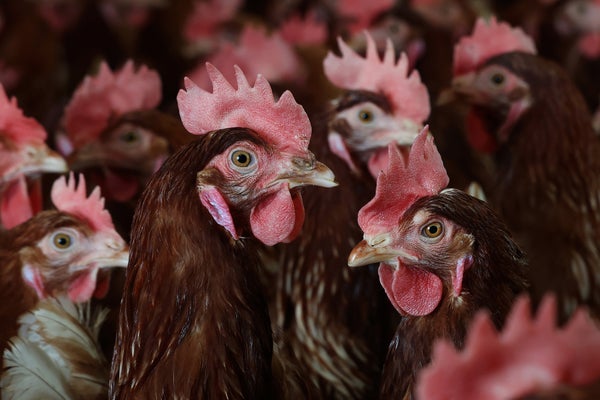
RFK, Jr. Wants to Let Bird Flu Spread on Poultry Farms. Why Experts Are Concerned
www.scientificamerican.com
March 19, 20254 min readRFK, Jr. Wants to Let Bird Flu Spread on Poultry Farms. Why Experts Are ConcernedHealth secretary RFK, Jr. has repeatedly suggested that farmers should let bird flu spread through flocks. Experts explain why thats a dangerous ideaBy Stephanie Pappas edited by Jeanna BrynerChickens stand in a henhouse in Petaluma, Calif., on February 18, 2025. Justin Sullivan/Getty ImagesWith H5N1 avian influenza spreading in poultry flocks, Secretary of Health and Human Services Robert F. Kennedy, Jr., is pushing a new plan: let the virus rip.Kennedy recently told Fox News that by letting the highly pathogenic bird flu spread through flocks, farmers could identify the birds, and preserve the birds, that are immune to it.But poultry experts say that, in addition to causing an unimaginable poultry death toll, this plan wouldnt work.On supporting science journalismIf you're enjoying this article, consider supporting our award-winning journalism by subscribing. By purchasing a subscription you are helping to ensure the future of impactful stories about the discoveries and ideas shaping our world today.No, not for this disease, says Rocio Crespo, a poultry veterinarian at the North Carolina State University College of Veterinary Medicine. This is crazy.How Bird Flu Impacts FarmsFarmers must currently cull infected flocks to contain the disease before it spreads. Theyre financially compensated for the culled birds by the U.S. Department of Agriculture. The policy is supported by science because highly pathogenic avian influenza is so deadly on its own, killing 90 to 100 percent of chickens in three or four days, says Matt Koci, an immunologist and virologist at North Carolina State Universitys poultry science department.The disease overwhelms birds, Crespo says. Its devastating, she says. Its a disease that attacks every single organ.As a result, the chickens never develop the antibodies that would beat back the flu and give them the ability to survive a second encounter with the virus they die too quickly. That means there is little for scientists to study to develop treatments or uncover some genetic secret to resistance, Koci says. Genetic resistance in chickens and turkeys is not a thing, he says.What the Experts SayEven with avian diseases that are slower-acting than highly pathogenic bird flu, scientists have struggled to find a key to genetic resistance. Huaijun Zhou, a professor of animal science at the University of California, Davis, worked on a project on Newcastle disease, another viral illness that is also nearly always fatal in poultry but that some infected birds can survive for weeks. We didnt find any magic bullet, Zhou says.There were genetic variants in chickens that allowed the birds to survive longer with Newcastle disease. Yet each one had a tiny effect, and it took a combination of hundreds of them to make a noticeable difference in survival. Its just the nature of the disease, says Zhou, adding that the bird flus high mortality rate makes success even less likely.Kennedys remarks belie a lack of knowledge about the way poultry breeding works, Koci says. The chickens that provide meat and eggs are not in the breeding population: theyre the product of parent generations that are bred to maximize disease resistance and meat or egg production. Wiping out the working offspring of these breeders wouldnt do anything to alter the next generations of chickens coming down the line.Another problem with the let-it-rip strategy would be the inability of farmers to sell chicken products internationally because the policy might lead importers to ban American products. The resulting mass poultry death would also make todays egg prices look like a great deal.The Chick-fil-As and the Kentucky Fried Chickens and all the chicken dinners you have, forget it, Crespo says, gone.How Scientists Are Tackling the Bird Flu CrisisCulling and containment have been successful at controlling bird flu in the U.S. since the 1980s, Koci says. The currently circulating strain, however, has thrown a wrench in the system by finding new ways onto poultry farms. In the past, bird flu spread to new farms through the droppings of infected migratory birds, meaning the danger was largely limited to summer and fall, when these birds passed through. Now the disease is in nonmigratory wild birds, as well as wild mammals. The risk is year-round, and scientists arent entirely sure how the virus gets onto farms.Were trying to understand: Can we figure out these other point sources, and can we change how we do biosecurity? Koci says.In the longer term, Zhou says, researchers are looking at genetic variations in the way poultry respond to vaccination. Currently, vaccines are not used because, although they can keep chickens alive, they dont prevent infection. That means that infected chickens could spread disease even if they were vaccinated, so farmers wouldnt be able to export products from such inoculated birds. Understanding why the immune systems of some chickens respond better than others could help scientists develop vaccines that better tamp down transmission.Kennedy does not have a say in the U.S.s agricultural policies. But, as the New York Times reported on Tuesday, Secretary of Agriculture Brooke Rollins has also indicated support for the let-it-rip idea, telling Fox News that some farmers are interested in piloting the strategy.In a statement, Emily Hilliard, the deputy press secretary at the Department of Health and Human Services said, We want to keep people away from the most dangerous version of the current bird flu, which is found in chickens. Culling puts people at the highest risk of exposure, which is why Secretary Kennedy and NIH want to limit culling activities. Culling is not the solution. Strong biosecurity is.But viral spread leads to more viral particles in the environment, begetting more viral spread, Crespo says.And a no-cull policy would expose farmworkers to sick chickens, according to Koci. Youre exposing more humans to more chickens, he says, and just buying more lottery tickets for that pandemic strain.
0 Comments
·0 Shares
·75 Views


